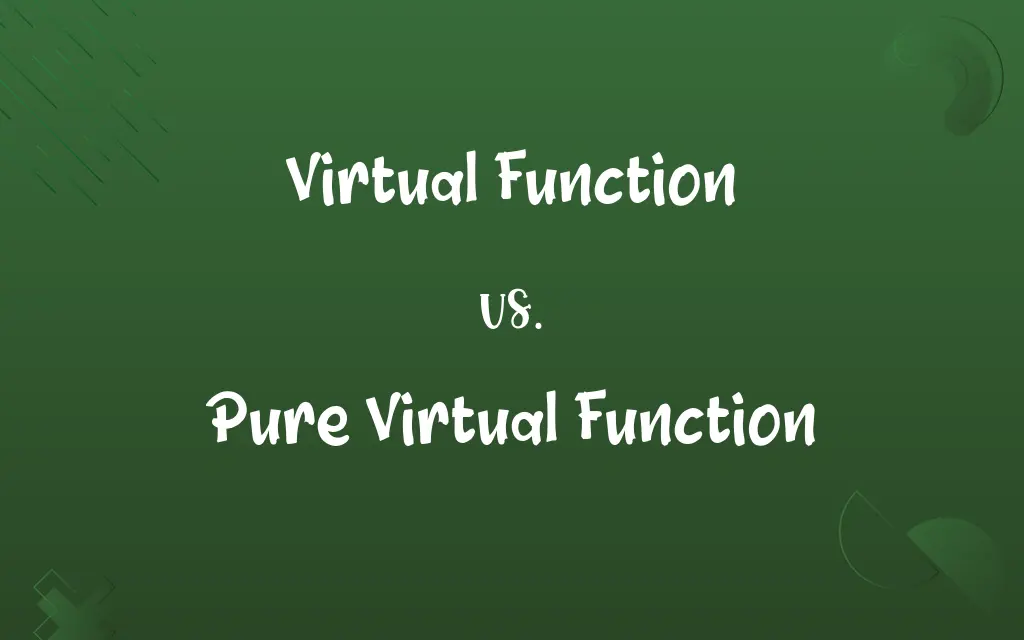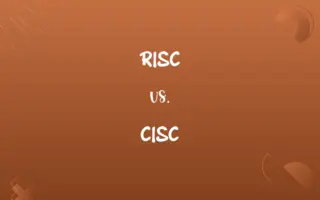Virtual Function vs. Pure Virtual Function: Know the Difference

By Hifza Nasir & Dua Fatima || Published on March 5, 2024
Virtual functions in C++ allow derived classes to override a base class function, while pure virtual functions make a class abstract, requiring derived classes to provide an implementation.

Key Differences
Virtual functions in C++ are member functions that can be overridden in derived classes, enabling polymorphism. This allows for dynamic dispatch, where the function called is determined at runtime based on the object's type. Pure virtual functions, declared with "= 0" in their declaration, serve to create abstract classes. These classes cannot be instantiated directly and compel derived classes to implement the pure virtual function, ensuring a specific interface is followed.
Dua Fatima
Mar 05, 2024
By defining a virtual function in a base class, you enable functionality that can be extended or modified in derived classes. This provides flexibility in how classes interact, making code more modular and reusable. Conversely, a pure virtual function does not provide a default implementation, pushing the responsibility of defining the function's behavior onto the derived class, which can ensure that all derived classes adhere to a uniform interface.
Hifza Nasir
Mar 05, 2024
Virtual functions are used when a base class has a default implementation that might be sufficient for some derived classes. This allows derived classes to use the base class implementation or override it with their own. In contrast, pure virtual functions are used when there is no meaningful default behavior that the base class can provide, making it essential for the derived class to provide its own implementation.
Dua Fatima
Mar 05, 2024
The concept of virtual functions enables C++ to support runtime polymorphism, an essential feature of object-oriented programming. This allows for more flexible and dynamic code structures. Pure virtual functions, on the other hand, are a key component in designing abstract base classes and interfaces, guiding the architectural structure of complex systems by mandating certain behaviors in the derived classes.
Hifza Nasir
Mar 05, 2024
Virtual and pure virtual functions play crucial roles in the implementation of polymorphism and inheritance in C++. While virtual functions provide a mechanism for dynamic behavior change, pure virtual functions enforce a contract for derived classes, highlighting the blend of flexibility and structure in object-oriented design.
Dua Fatima
Mar 05, 2024
ADVERTISEMENT
Comparison Chart
Definition
A function that can be overridden by derived classes.
A function that must be implemented by derived classes.
Hifza Nasir
Mar 05, 2024
Purpose
To allow derived classes to modify or extend base class functionality.
To make a class abstract and ensure that derived classes provide an implementation.
Hifza Nasir
Mar 05, 2024
Instantiation
Classes with virtual functions can be instantiated.
Classes with pure virtual functions cannot be instantiated.
Dua Fatima
Mar 05, 2024
Usage
When a default implementation may be overridden.
When there is no meaningful default implementation.
Hifza Nasir
Mar 05, 2024
ADVERTISEMENT
Virtual Function and Pure Virtual Function Definitions
Virtual Function
A virtual function allows derived classes to override it.
Virtual void display() { cout << Base class display; }.
Hifza Nasir
Feb 26, 2024
Pure Virtual Function
Facilitates strict polymorphism.
Enforces behavior uniformity across derived classes.
Shumaila Saeed
Feb 26, 2024
Virtual Function
It supports runtime polymorphism.
Base* ptr = new Derived(); ptr->display().
Dua Fatima
Feb 26, 2024
Pure Virtual Function
It makes the class abstract.
Class with pure virtual function cannot be instantiated.
Hifza Nasir
Feb 26, 2024
Virtual Function
Provides a default implementation that can be used or replaced.
Derived class did not override display, Base's version is used.
Dua Fatima
Feb 26, 2024
ADVERTISEMENT
Pure Virtual Function
Ensures derived classes follow a specific interface.
Derived class must implement the display function.
Hifza Nasir
Feb 26, 2024
Virtual Function
Enables dynamic dispatch in C++.
Virtual function call is resolved at runtime.
Hifza Nasir
Feb 26, 2024
Pure Virtual Function
Used in abstract base classes and interfaces.
Defines a contract for derived classes.
Dua Fatima
Feb 26, 2024
Virtual Function
Used when base class provides a common interface.
All derived classes can use or modify the display function.
Dua Fatima
Feb 26, 2024
Pure Virtual Function
A pure virtual function requires an override in derived classes.
Virtual void display() = 0.
Dua Fatima
Feb 26, 2024
Repeatedly Asked Queries
What is a virtual function in C++?
A virtual function is a member function in a base class that can be overridden by derived classes to provide specialized behavior.
Dua Fatima
Mar 05, 2024
What is the role of pure virtual functions?
Pure virtual functions define an interface that all derived classes must implement, making the base class abstract.
Hifza Nasir
Mar 05, 2024
Can a virtual function have an implementation?
Yes, a virtual function can have an implementation in the base class, providing a default behavior that derived classes can override.
Dua Fatima
Mar 05, 2024
What happens if a derived class doesn't override a pure virtual function?
If a derived class doesn't override a pure virtual function, it remains abstract and cannot be instantiated.
Dua Fatima
Mar 05, 2024
Why might a class have both virtual and pure virtual functions?
A class might have both to provide some default behaviors while also requiring certain functions to be implemented by derived classes, creating a mix of flexibility and strict interface adherence.
Dua Fatima
Mar 05, 2024
What makes a function pure virtual?
A function becomes pure virtual when it is declared with "= 0" in its declaration, indicating it must be implemented by derived classes.
Hifza Nasir
Mar 05, 2024
What is an abstract class in C++?
An abstract class is a class that cannot be instantiated and typically contains one or more pure virtual functions, serving as a base for other classes.
Shumaila Saeed
Mar 05, 2024
Can a class with a pure virtual function be instantiated?
No, classes with pure virtual functions are considered abstract and cannot be instantiated.
Hifza Nasir
Mar 05, 2024
Why use virtual functions?
Virtual functions allow for dynamic polymorphism, enabling runtime selection of function implementations based on the object type.
Shumaila Saeed
Mar 05, 2024
How do virtual functions support polymorphism?
Virtual functions support polymorphism by allowing derived classes to override base class functions, enabling dynamic behavior based on the object's actual type.
Dua Fatima
Mar 05, 2024
Is it possible to have a pure virtual destructor?
Yes, a destructor can be pure virtual, requiring a derived class to provide an implementation, though the base class must also provide a definition.
Hifza Nasir
Mar 05, 2024
Can a class be derived from an abstract class without implementing its pure virtual functions?
Yes, but the derived class will also be abstract and cannot be instantiated until it provides implementations for all inherited pure virtual functions.
Dua Fatima
Mar 05, 2024
How do constructors work with virtual and pure virtual functions?
Constructors cannot be virtual or pure virtual. They are used to initialize objects and do not participate in polymorphism.
Hifza Nasir
Mar 05, 2024
Can a pure virtual function have a body?
Yes, a pure virtual function can have a body defined outside the class declaration, though it's uncommon.
Hifza Nasir
Mar 05, 2024
How do virtual and pure virtual functions differ in use?
Virtual functions are used when there's a default behavior that might be sufficient or needs to be extended, while pure virtual functions are used to enforce a contract for derived classes to implement specific behavior.
Hifza Nasir
Mar 05, 2024
Share this page
Link for your blog / website
HTML
Link to share via messenger
About Author
Written by
Hifza NasirCo-written by
Dua Fatima








































































